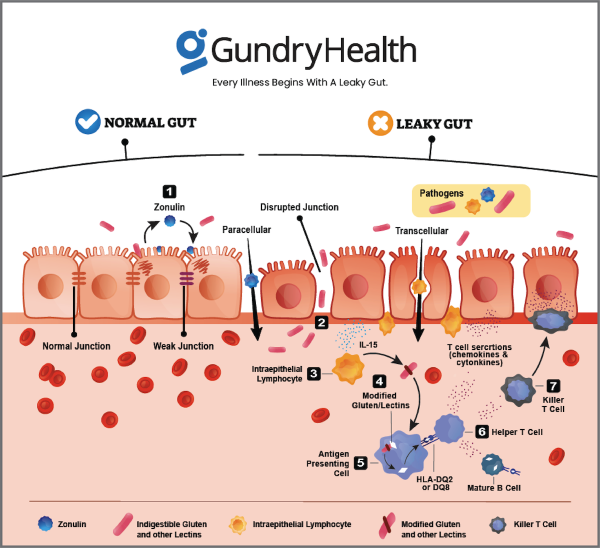Guillain-Barre Syndrome: How This Nerve Disorder Is Linked to Leaky Gut Syndrome
Guillain-Barre Syndrome (GBS) is a rare autoimmune disease that affects the peripheral nervous system, causing weakness, tingling, and paralysis. The immune system of the body mistakenly attacks the peripheral nervous system. The peripheral nervous system consists of nerves that transmit information from the brain and spinal cord to other parts of the body, including muscles and organs. When the immune system attacks these nerves, it causes inflammation and damage, resulting in muscle weakness, tingling, and paralysis.
It is relatively uncommon, affecting about 1-2 people per 100,000 each year, but it can be a severe and life-threatening condition.
What Do Guillain-Barre Syndrome and Leaky Gut Syndrome Have in Common?
Leaky gut syndrome is a condition where your intestinal lining becomes damaged and porous, allowing undigested food particles, toxins, bacteria, and other harmful substances to leak into your bloodstream. This triggers an immune reaction, as your body tries to fight off these foreign invaders. However, this also causes chronic inflammation, which can damage your tissues and organs over time.
Leaky gut syndrome is at the root of most autoimmune diseases, such as rheumatoid arthritis, lupus, multiple sclerosis, psoriasis, and of course, Guillain-Barre Syndrome. Autoimmune diseases are conditions where your immune system mistakenly attacks your own cells and tissues, causing various symptoms and complications. The reason why this happens is because of molecular mimicry: some of the substances that leak from your gut resemble your own tissues, so your immune system gets confused and attacks both.
One of the biggest contributing factors to the development of Guillain-Barre Syndrome is leaky gut syndrome, but it also may occur after a viral or bacterial infection, like the flu or pneumonia. It is believed that an infection triggers the immune system to attack the peripheral nerves. Other possible triggers include surgery, trauma, vaccinations or certain foods.
Eating certain foods, such as lectins (a type of protein found in many plant foods), dairy products (milk), soy products (tofu), red meat (beef), sugar (candy), caffeine (coffee), alcohol (wine), or spicy foods (chili) can trigger autoimmune reaction. These foods can also cause or worsen leaky gut syndrome by irritating your gut lining or feeding the bad bacteria in your gut.
Lectins, a type of protein found in plant foods, can contribute to leaky gut syndrome by binding to the gut lining and compromising its integrity. Moreover, lectins bear resemblance to proteins present in peripheral nerves, such as myelin. Consequently, when lectins leak into the bloodstream, the immune system may mistakenly target the peripheral nerves. This can lead to Guillain-Barre Syndrome or other nerve disorders1
Symptoms of Guillain-Barre Syndrome
The symptoms of Guillain-Barre Syndrome usually start with tingling or weakness in the feet or legs, which then spreads to the upper body. In some cases, the symptoms can progress rapidly, leading to paralysis and difficulty breathing. Other symptoms may include:
- Tingling or numbness in the hands and feet
- Muscle weakness
- Difficulty swallowing or speaking
- Rapid heart rate
- Low blood pressure
- Bladder or bowel dysfunction
How To Diagnose and Treat Guillain-Barre Syndrome and Leaky Gut Syndrome?
Guillain-Barre Syndrome and leaky gut syndrome can be difficult to diagnose, as they can cause a variety of symptoms that can be mistaken for other conditions. To make a diagnosis, your doctor will need to take a detailed medical history, perform a physical examination, and order some tests to confirm your condition. These tests may include:
- Blood tests to check for inflammation, antibodies, or infections
- Urine tests to check for toxins or infections
- Stool tests to check for parasites, bacteria, or yeast
- Nerve conduction studies or electromyography to check for nerve damage or dysfunction
- Spinal tap or lumbar puncture to check for increased protein in the cerebrospinal fluid
The treatment of Guillain-Barre Syndrome and leaky gut syndrome depends on the severity and cause of your condition. Some of the possible treatments include:
- Medications or supplements to reduce inflammation, regulate nerve function, balance gut bacteria, or heal the gut lining
- Dietary changes to eliminate foods that cause leaky gut syndrome or Guillain-Barre Syndrome symptoms and to include foods that support gut health and nerve health
- Lifestyle changes to reduce stress, improve sleep, exercise moderately, and avoid toxins or infections
- Alternative therapies such as acupuncture, massage, yoga, meditation, or herbal remedies to relieve pain, inflammation, or stress
- Supportive care such as ventilator support, physical therapy, or rehabilitation to help with breathing, mobility, and recovery
How To Prevent or Heal Guillain-Barre Syndrome and Leaky Gut Syndrome with Diet and Lifestyle Changes at Gundry Health?
While some forms of Guillain-Barre Syndrome and leaky gut syndrome are not preventable, you can still take steps to improve your overall health and reduce your risk of complications. Some of the best ways to do so are:
- Eat a balanced diet that is rich in plant-based foods, healthy fats, and lean proteins. Avoid foods that are high in sugar, refined carbs, lectins, gluten, dairy, soy, corn, and nightshades. These foods can trigger inflammation, disrupt your gut microbiome, and impair your immune system2
- Drink plenty of water and stay hydrated throughout the day. Dehydration can worsen your symptoms and affect your blood volume and pressure.
- Avoid alcohol, caffeine, nicotine, and drugs that can interfere with your nerve function. These substances can cause dehydration, increase your heart rate and blood pressure, and affect your mood and sleep quality.
- Manage your stress levels and practice relaxation techniques. Stress can activate your sympathetic nervous system (the fight-or-flight response) and cause a surge of adrenaline and cortisol. This can exacerbate your symptoms and damage your nerves over time.
- Get enough sleep and follow a regular sleep schedule. Sleep is essential for repairing your body and regulating your hormones. Lack of sleep can impair your cognitive function, mood, metabolism, and immune system.
- Exercise moderately and regularly but avoid overexertion or extreme temperatures. Exercise can improve your cardiovascular health, muscle tone, blood flow, and mood. However, too much exercise or exposure to heat or cold can trigger your symptoms and cause a drop or spike in your blood pressure or heart rate.
Recovery from Guillain-Barre Syndrome
Recovery from Guillain-Barre Syndrome can be slow and unpredictable, with some patients taking weeks or months to recover fully. Physical therapy and rehabilitation can help regain strength and mobility. Most people with Guillain-Barre Syndrome make a full recovery, although some may experience long-term complications such as weakness or fatigue.
Recent Findings
Recent research suggests that there may be a link between Guillain-Barre Syndrome and the COVID-19 vaccine. Although the risk of developing Guillain-Barre Syndrome from the vaccine is rare, it is still essential to be aware of the potential risks and benefits of vaccination. Additionally, experimental treatments such as stem cell therapy and nerve growth factors are being studied for their potential use in treating Guillain-Barre Syndrome.
At Gundry Health, we offer a holistic approach to clinical care that addresses the root causes of Guillain-Barre Syndrome and leaky gut syndrome. We use a combination of lab data (blood tests), provider treatment (medications), dietary changes (lectin-free diet), supplements (probiotics), lifestyle modification (stress management), alternative therapies (acupuncture), supportive care (ventilator support), as well as education (books) to help you heal your gut and improve your overall health. By following our protocol, you can prevent or heal Guillain-Barre Syndrome and leaky gut syndrome and reduce the risk of autoimmune disease.
Get personalized care and recommendations for Guillain-Barre Syndrome from Dr Gundry-Approved program
If you’re looking for more guidance about Guillain-Barre Syndrome disease than this short list of recommendations, Dr. Gundry’s unique health program is now available to you (without needing an appointment at one of Dr. Gundry’s two, waitlist-only West Coast clinics).
Thanks to the pioneering work of Dr. Gundry and his team at Gundry Health, patient care team trained in Dr. Gundry’s unique holistic methods are now available to help you craft your own personalized Guillain-Barre Syndrome program.
It’s easy to get started.
Simply click the link below to get more information about personalized Guillain-Barre Syndrome treatment plan options, so you can get expert analysis, diagnostic care, and a plan for tackling lupus, arthritis, or other autoimmune diseases.
Each patient care team member at Gundry Health is Board Certified and trained in Dr. Gundry’s renowned approach to functional medicine and care.
Get your personal lab data and talk to a U.S. licensed doctor. Click Here.
If you have any questions or concerns about Guillain-Barre Syndrome or leaky gut syndrome, please contact us at Gundry Health to schedule an appointment with one of our qualified health professionals. You can also visit our website for more information and resources3
1: https://www.ncbi.nlm.nih.gov/pmc/articles/PMC5605935/







